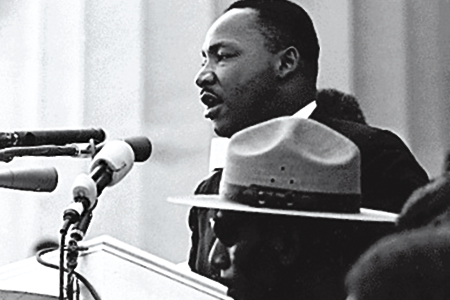
How to be an (extra)ordinary revolutionary
Issue 78 March 2011
One ordinary individual can be the catalyst for change.
On December 17th 2010, a 26-year old Tunisian fruit seller set himself on fire in front of a government building. The graduate, who could not find a job, was trying to earn a living with his stall. On that fateful day, he was halted by a police officer who seized his goods, claiming that the man was working without the necessary legal permit. It is not clear what happened next: did the police officer slap him, or did he go into a centre for unemployed graduates to complain of his treatment only to be faced with laughter and insults? We will never be sure. But this much we do know: what the young man did next has sparked a regional revolution.
Eighteen days later, on January 4th, he died of severe burns. Ironically, he was even visited in hospital by the man he was protesting against, President Zine El-Abidine Ben Ali, and a photo was released of the meeting by the presidency. The death of the young man, Muhammad Al Bouazizi, was seen as a symbol for all the young college graduates who were unemployed; a catalyst for the demonstrations that led to the fall of the President and his departure from the country.
Having seen what was possible in Tunisia, Egyptians gathered the courage to follow suit. An unknown young woman’s YouTube video encouraging people to protest in Tahrir Square was one of the triggers for unrest in Egypt, and as I write this, the will of Egyptian people has led Mubarak stepping down. They were ordinary people, engaging in acts that a few months ago would have been extraordinary. Courage filled their bellies. The King of Jordan has also seen the writing on the wall and dismissed his cabinet, realising that if he does not pre-empt change, then he himself will be its casualty.
History has many names filling its books, of men and women who through their actions have brought revolution and improvements. These include familiar popular heroes like Malcolm X, Martin Luther King, Nelson Mandela. Individuals like these are held up as inspirations of what one person can achieve. However, it is those whose names may well be forgotten, but whose actions and their consequences will live on - like Bouazizi, like the video protagonist - which I find particularly motivational. These are ‘ordinary’ people, like you and me, with no label, pedestal or distinction. The risk with ‘great names’ is that we put them on a pedestal, and believe that we are unable to effect the change of these great personalities. The weight of history can intimidate us, feeling that we are not ‘great’ in our selves, that we are unworthy of making our mark on the human course of events. But this is simply not true. Al Bouazizi and countless others show us that one single individual can be a catalyst for change. I am not advocating that we go round setting ourselves on fire - self-harm is contrary to Islamic philosophy. However, a single action can have potent repercussions. Even a word said can resonate over time and place to create change. There is no more popular and oft-repeated phrase today than Martin Luther King’s “I have a dream.” These four words continue to evoke a passion for change.
Prophet Muhammad’s birthday in February also reminds us what an enormous impact one individual can make. None of them set out to be great, they all simply set out to do the right thing to the best of their capacity. It was the cumulative effect of each action going towards a better world that has set them up as individuals to inspire us, and it is the choice to make each action the right action - and for each action to count - that is important. One of my favourite children’s stories from Islamic history is that of Prophet Ibrahim when thrown onto the fire by King Nimrod for denying Nimrod’s divinity. The little ants scurry around trying to put out the fire. As a child, I recall how a conversation between one of the angels that descends and one of the ants that is busy ferrying drops of water from a nearby puddle onto the enormous inferno is played out. “Why are you bothering?” asks the angel. The ant replies very simply, “Because at least I know that I have done my part.”
Shelina is the author of Love in a Headscarf, and writes a blog at www.spirit21.co.uk
Bookmark this |
|
Add to DIGG |
|
Add to del.icio.us |
|
Stumble this |
|
Share on Facebook |
|
Share this |
|
Send to a Friend |
|
Link to this |
|
Printer Friendly |
|
Print in plain text |
|


Comments
0 Comments